When albumin levels drop below normal in the blood, the body experiences significant changes that affect multiple organ systems. Albumin is a crucial protein made by the liver that helps maintain proper fluid balance and transports important substances throughout the body.
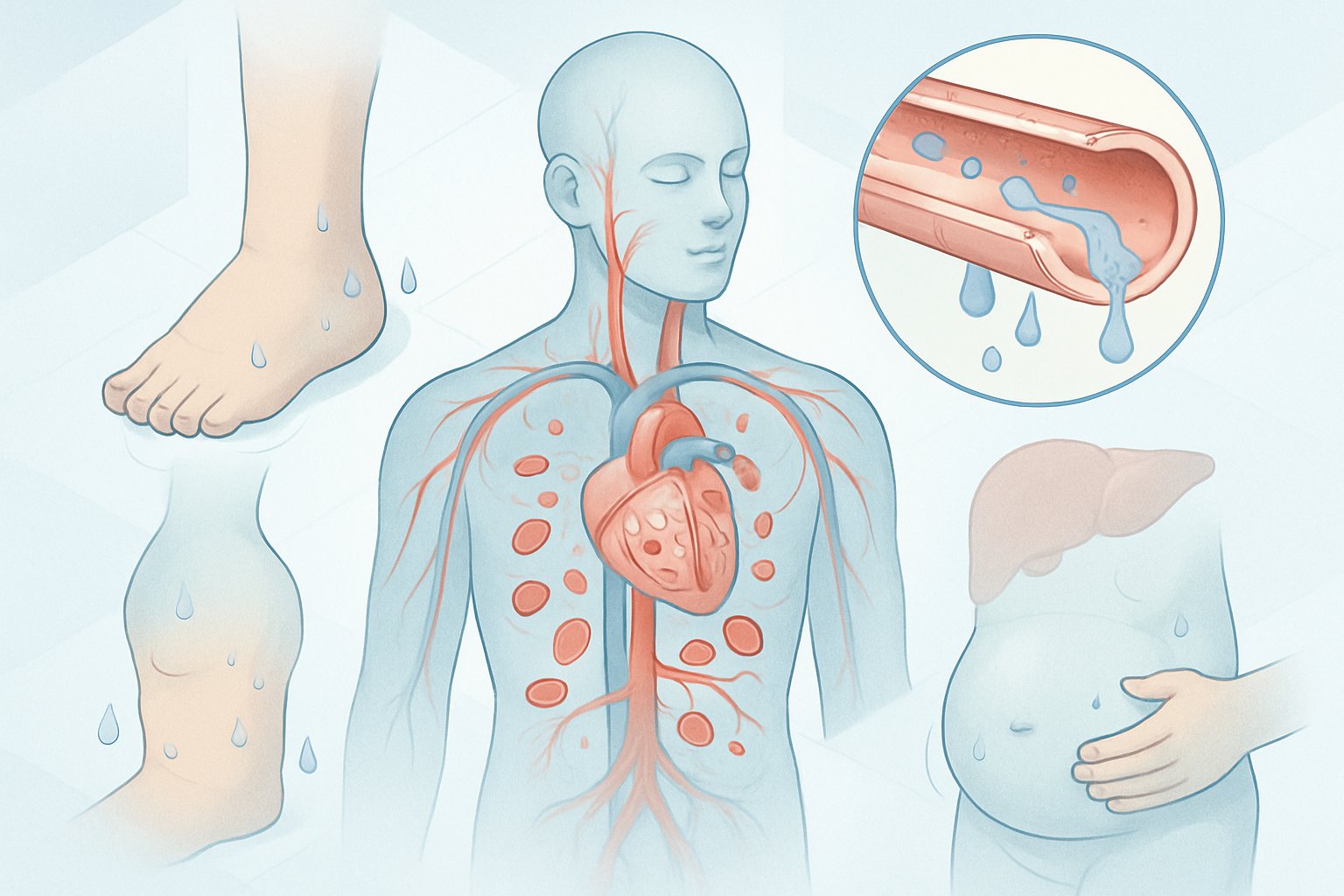
Low albumin causes fluid to leak from blood vessels into tissues, leading to swelling, while also disrupting the transport of vitamins, hormones, and enzymes that cells need to function properly. This condition, called hypoalbuminemia[1], occurs when the body cannot produce enough albumin or loses too much through urine or stool.
The effects extend beyond simple swelling and can create serious complications affecting the heart, kidneys, and other vital organs[2]. Understanding these changes helps people recognize symptoms early and seek appropriate medical care to address the underlying causes.
Key Takeaways
- Low albumin causes fluid to leak into tissues, creating swelling and disrupting normal body functions
- The condition can lead to serious complications affecting the heart, kidneys, and other major organ systems
- Treatment focuses on addressing underlying causes like liver disease, kidney problems, or poor nutrition through diet changes and medical interventions
Understanding Albumin and Its Functions
Albumin is the most abundant protein in blood plasma, making up about 60% of all plasma proteins. This vital protein maintains proper fluid distribution, transports essential substances throughout the body, and provides important protective functions.
Role of Albumin in Fluid Balance
Serum albumin maintains intravascular oncotic pressure[3], which keeps fluid inside blood vessels where it belongs. This oncotic pressure, also called colloid osmotic pressure, works like a magnet that pulls water back into the bloodstream from surrounding tissues.
When albumin levels drop, this pulling force weakens. Fluid then leaks out of blood vessels and collects in tissues and body cavities. This causes swelling in the legs, ankles, and abdomen.
The liver produces all albumin through albumin synthesis. Normal albumin levels range from 3.4 to 5.4 grams per deciliter[4]. Below this range, fluid balance problems begin to occur.
Albumin as a Transport Protein
Albumin acts like a delivery truck in the bloodstream. It carries hormones, vitamins, and enzymes throughout the body[4]. This plasma protein also transports medications, fatty acids, and metal ions like calcium and zinc.
The protein has special binding sites that grab onto different substances. It can carry multiple items at once without mixing them together. This transport function helps deliver nutrients to cells and remove waste products.
When albumin levels fall, the body struggles to move these important substances efficiently. Medications may not work as well because they cannot reach their target areas properly.
Antioxidant and Buffer Functions
Albumin protects cells from damage by acting as an antioxidant. It neutralizes harmful free radicals that can hurt tissues and organs. The protein also helps maintain proper pH levels in the blood by acting as a buffer.
This plasma protein contains sulfur groups that trap dangerous molecules before they cause harm. It works alongside other antioxidants like vitamin C and vitamin E to keep the body healthy.
Albumin also binds to toxic substances and helps remove them from the bloodstream. This protective function becomes compromised when albumin synthesis decreases or when the body loses too much protein.
How Low Albumin Affects the Body
Low albumin levels create a cascade of physical problems throughout the body. The most noticeable effects include fluid buildup in tissues, belly swelling, and constant tiredness.
Edema and Swelling
Hypoalbuminemia happens when the body doesn’t produce enough albumin protein[1], which normally keeps fluid inside blood vessels. When albumin levels drop, fluid leaks out of blood vessels into surrounding tissues.
This fluid leak causes edema – visible swelling that typically starts in the legs and feet. The swelling often gets worse throughout the day as gravity pulls fluid downward.
Patients may notice their shoes feel tight by evening. Socks leave deep marks around the ankles. The skin may look shiny and stretched over swollen areas.
Common edema locations include:
- Ankles and feet
- Lower legs and calves
- Hands and fingers
- Face and eyelids (especially in the morning)
The swelling usually presses in when pushed with a finger. This leaves a temporary dent in the skin called pitting edema.
Ascites and Fluid Accumulation
Low serum albumin causes fluid to collect inside the belly cavity. This condition is called ascites. The abdomen becomes swollen and distended as fluid builds up.
Ascites develops when albumin levels drop below normal ranges. The fluid cannot stay in blood vessels without enough albumin protein to hold it there.
Patients with ascites often experience:
- Belly bloating and tightness
- Weight gain from excess fluid
- Difficulty breathing when lying flat
- Feeling full after eating small amounts
The fluid buildup can hold several liters of liquid. This makes the belly appear much larger than normal. Clothes may not fit properly around the waist.
Ascites severity levels:
| Grade | Fluid Amount | Symptoms |
|---|---|---|
| Mild | Small | Barely noticeable |
| Moderate | Medium | Visible belly swelling |
| Severe | Large | Major distension, breathing problems |
Fatigue and Weakness
Hypoalbuminemia causes severe tiredness that doesn’t improve with rest. Low albumin levels affect how the body transports nutrients and maintains proper fluid balance.
The fatigue feels different from normal tiredness. Patients describe feeling drained and weak throughout the day. Simple tasks become difficult to complete.
Energy problems occur because:
- Nutrients don’t transport properly through the blood
- Fluid imbalances stress the heart and kidneys
- The body works harder to maintain normal functions
- Sleep may be disrupted by swelling and discomfort
This constant fatigue affects daily activities. People may struggle to work, exercise, or take care of household tasks. The weakness can make climbing stairs or lifting objects more challenging than usual.
Mental fatigue often accompanies physical tiredness. Concentration becomes harder and thinking feels foggy.
Health Risks and Complications of Hypoalbuminemia
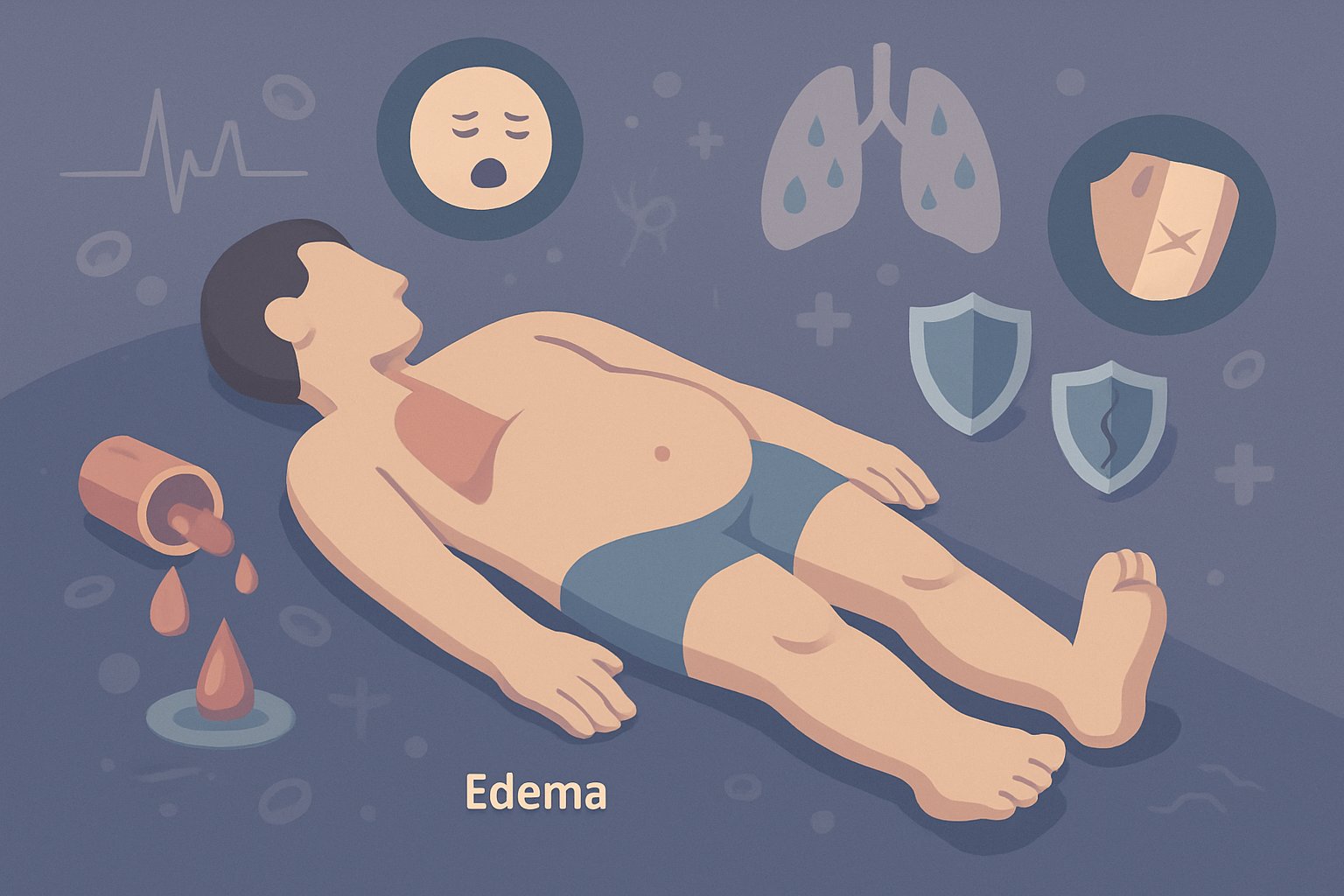
Low albumin levels create serious health problems that affect multiple body systems. Hypoalbuminemia can cause big health problems[2] in the heart, kidneys, brain, and digestive system, while also weakening the immune system and slowing recovery from illness or injury.
Increased Susceptibility to Infections
Albumin plays a crucial role in immune system function by transporting antibodies and other immune proteins throughout the body. When albumin levels drop, the body’s ability to fight off bacteria, viruses, and other pathogens becomes compromised.
Patients with hypoalbuminemia develop infections more frequently than those with normal albumin levels. Common infection sites include the lungs, urinary tract, and surgical wounds.
Critical illness often worsens this problem. Hospital patients with low albumin face higher rates of pneumonia and bloodstream infections. The risk becomes especially high when albumin levels fall below 2.5 g/dL.
Chronic kidney disease patients experience this complication frequently. Their bodies lose albumin through damaged kidneys, creating a cycle where infection risk increases while the body struggles to produce enough protein to maintain immune function.
Poor Wound Healing
Albumin is essential for proper tissue repair and wound healing processes. The protein helps transport nutrients to healing tissues and maintains proper fluid balance around wound sites.
People with hypoalbuminemia experience significantly slower wound healing times. Surgical incisions take longer to close, and minor cuts or scrapes may become chronic wounds that refuse to heal properly.
Protein synthesis requires adequate albumin levels to build new tissue. Without enough albumin, the body cannot create the collagen and other proteins needed for strong, healthy scar tissue formation.
Pressure sores become a major concern for bedridden patients with low albumin. These wounds often become infected and may progress to dangerous deep tissue damage that threatens limb function or requires surgical intervention.
Malnutrition and Muscle Loss
Low albumin levels are associated with generalized weakness, low muscle mass, and increased inflammation[5]. This creates a dangerous cycle where malnutrition worsens hypoalbuminemia, which then makes nutritional recovery more difficult.
Protein-energy malnutrition develops when the body cannot maintain adequate protein stores. Patients lose muscle mass rapidly, especially in the arms and legs, leading to weakness and reduced mobility.
The liver prioritizes albumin production, but without enough dietary protein and calories, it cannot keep up with the body’s needs. This becomes particularly problematic in elderly patients who may already have reduced appetite or difficulty eating.
Nutritional deficiency extends beyond protein to include vitamins and minerals that albumin normally transports. Deficiencies in zinc, calcium, and fat-soluble vitamins become common complications.
Medication Interactions and Bioavailability
Albumin binds to many medications in the bloodstream, controlling how much active drug reaches target tissues. When albumin levels are low, medication dosing becomes unpredictable and potentially dangerous.
Drugs like warfarin, phenytoin, and furosemide rely on albumin binding for proper distribution. Patients with hypoalbuminemia may experience unexpected side effects or treatment failures when standard doses are used.
Free drug concentrations increase dramatically when insufficient albumin is available for binding. This can lead to toxic levels of certain medications, requiring careful monitoring and dose adjustments by healthcare providers.
Anesthesia management becomes more complex during surgery. Many anesthetic drugs bind to albumin, so patients with low levels may experience prolonged sedation or unexpected reactions to standard medication protocols.
Primary Causes of Low Albumin Levels
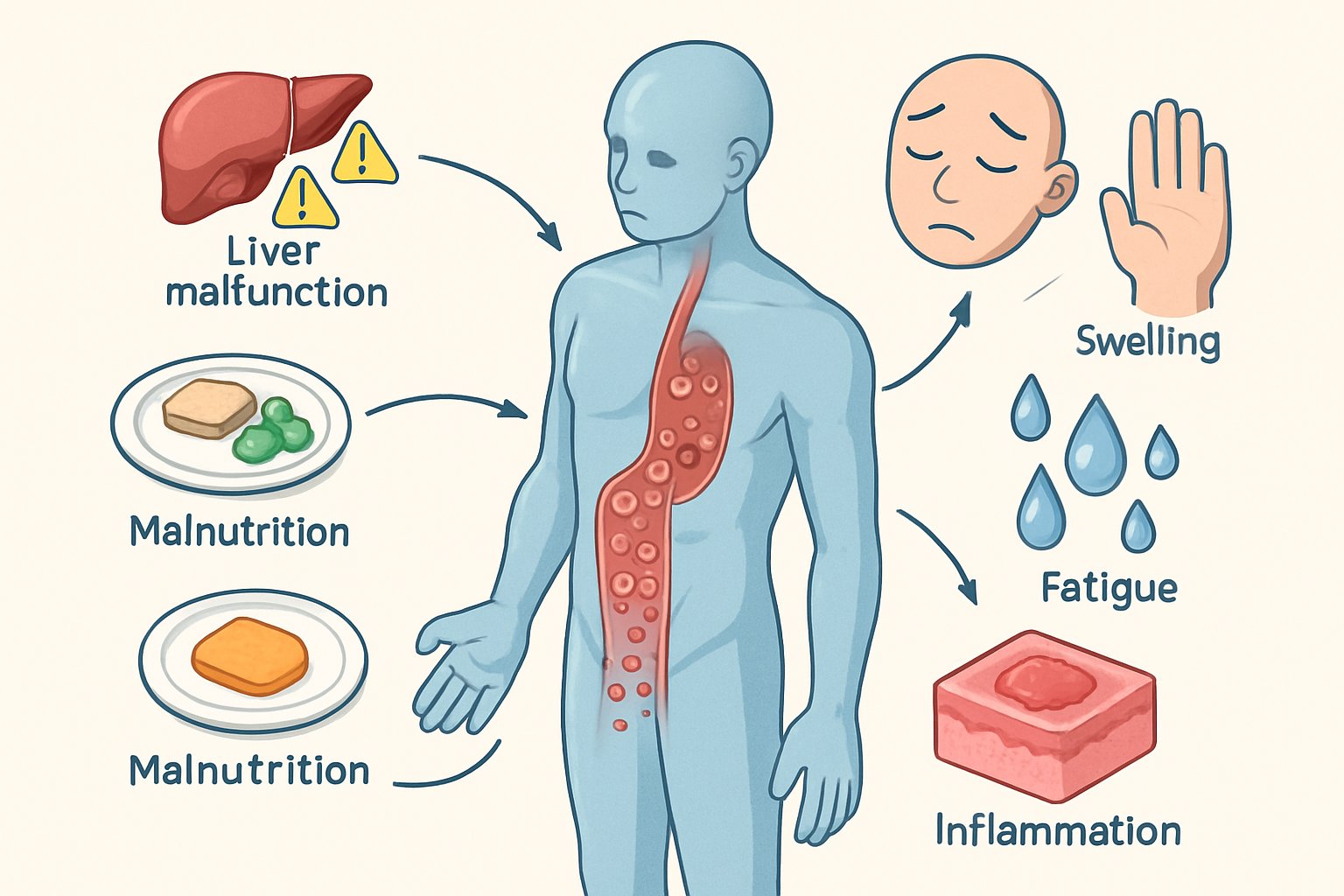
Low albumin levels develop when the liver cannot make enough albumin or when the body loses too much protein through the kidneys or digestive system. The three main causes involve liver problems that reduce albumin production, kidney damage that allows protein to escape, and poor nutrition that limits the building blocks needed for albumin creation.
Liver Disease and Impaired Synthesis
The liver produces all the albumin in the body. When liver disease occurs, albumin synthesis drops significantly.
Cirrhosis represents the most common liver condition that reduces albumin production. Scar tissue replaces healthy liver cells, making it harder for the organ to function properly.
Hepatitis also damages liver cells that make albumin. Both viral hepatitis and alcohol-related hepatitis can lower albumin levels over time.
Other liver diseases that affect albumin include:
- Fatty liver disease
- Liver cancer
- Acute liver failure
Doctors use liver function tests to check how well the liver works. These blood tests measure albumin levels along with other liver proteins.
People with severe liver dysfunction may have albumin levels below 2.5 grams per deciliter. Normal levels range from 3.5 to 5.0 grams per deciliter.
Kidney Disease and Protein Loss
Healthy kidneys filter waste but keep albumin in the blood. Kidney disease damages the filtering units called glomeruli, allowing albumin to leak into urine.
Proteinuria means protein in the urine. When albumin specifically appears in urine, doctors call it albuminuria.
Common kidney diseases that cause albumin loss include:
- Diabetic kidney disease
- Glomerulonephritis
- Nephrotic syndrome
- Chronic kidney disease
Kidney function tests help doctors find protein loss. A urine test can detect even small amounts of albumin.
Nephrotic syndrome causes the most severe albumin loss. People with this condition may lose more than 3.5 grams of protein daily through their urine.
The kidneys normally filter about 180 liters of blood each day. When kidney diseases develop, this filtering process fails to keep albumin where it belongs.
Nutritional Deficiency
The body needs protein and calories to make albumin. Malnutrition prevents the liver from producing enough albumin even when liver function stays normal.
Protein deficiency affects albumin production most directly. The liver requires amino acids from dietary protein to build albumin molecules.
Common nutritional causes include:
- Severe calorie restriction
- Protein-poor diets
- Eating disorders
- Digestive diseases that block nutrient absorption
Older adults face higher risks for nutrition-related low albumin. They may eat less food or have trouble absorbing nutrients properly.
People with inflammatory bowel disease or celiac disease may develop malnutrition even with adequate food intake. These conditions damage the intestines and reduce nutrient absorption.
Albumin synthesis requires energy and specific nutrients. Without proper nutrition, the liver cannot maintain normal albumin production rates regardless of liver health.
Other Causes and Contributing Factors
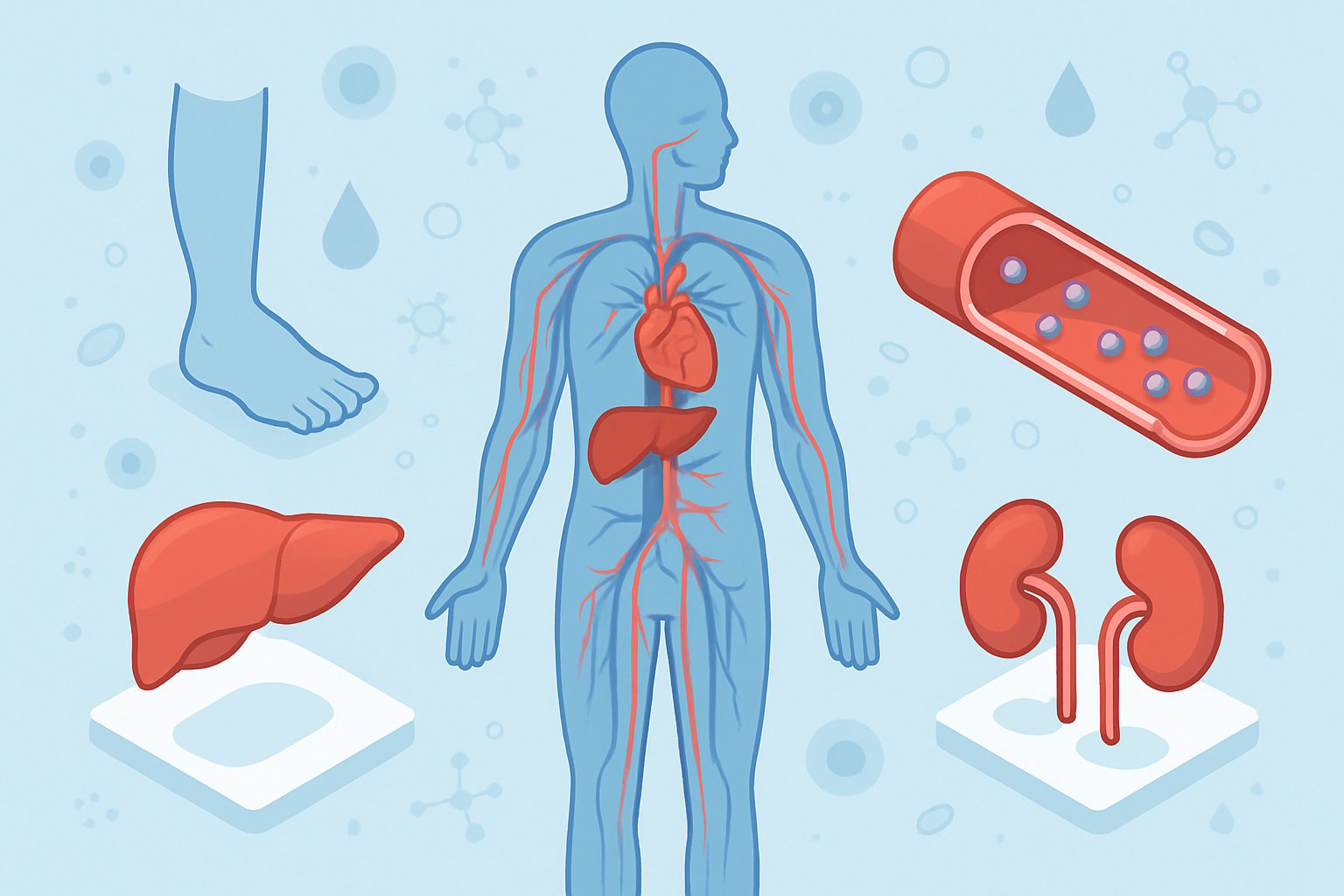
Several medical conditions beyond liver and kidney disease can reduce albumin levels in the blood. Inflammatory diseases increase protein breakdown, digestive disorders cause protein loss through the intestines, and severe burns lead to protein loss through damaged skin.
Inflammatory Conditions and Markers
Chronic inflammation significantly impacts albumin production and breakdown in the body. When inflammation occurs, the liver shifts its protein production away from albumin to make other proteins needed for immune responses.
C-reactive protein and other inflammatory markers often rise when albumin levels drop. This happens because the body prioritizes making proteins that fight inflammation over maintaining normal albumin levels.
Several inflammatory conditions commonly cause low albumin:
- Rheumatoid arthritis
- Inflammatory bowel disease (Crohn’s disease and ulcerative colitis)
- Systemic lupus erythematosus
- Chronic infections
Taking anti-inflammatory medicine can help treat inflammation[1] and may improve albumin levels over time. The inflammatory process also increases vascular permeability, which allows albumin to leak out of blood vessels into tissues.
Digestive Disorders and Protein Loss
Digestive system problems can cause significant protein loss through the intestines. This condition, called protein-losing enteropathy, prevents the body from keeping adequate albumin levels even when the liver works normally.
Celiac disease damages the small intestine lining when people eat gluten. This damage reduces protein absorption and increases protein loss through the digestive tract.
Inflammatory bowel disease affects albumin in two ways. First, inflammation reduces albumin production. Second, damaged intestinal walls leak proteins directly into the digestive system.
Other digestive conditions that lower albumin include:
- Severe diarrhea
- Intestinal infections
- Protein malabsorption disorders
Burns and Skin Loss
Severe burns cause rapid albumin loss through damaged skin surfaces. The burned skin cannot maintain its normal barrier function, allowing proteins to leak out of the body.
Large burns covering significant body surface area pose the greatest risk for low albumin. The protein loss happens quickly and can become life-threatening without proper treatment.
Taking antibiotics to treat severe burns[1] helps prevent infection and supports healing. Burns also increase vascular permeability throughout the body, not just at the burn site.
Other skin conditions that can reduce albumin include:
- Extensive wounds or ulcers
- Severe eczema or dermatitis
- Large surgical incisions
The body needs extra protein during burn recovery to replace lost albumin and support tissue healing.
Diagnosis and Assessment of Low Albumin
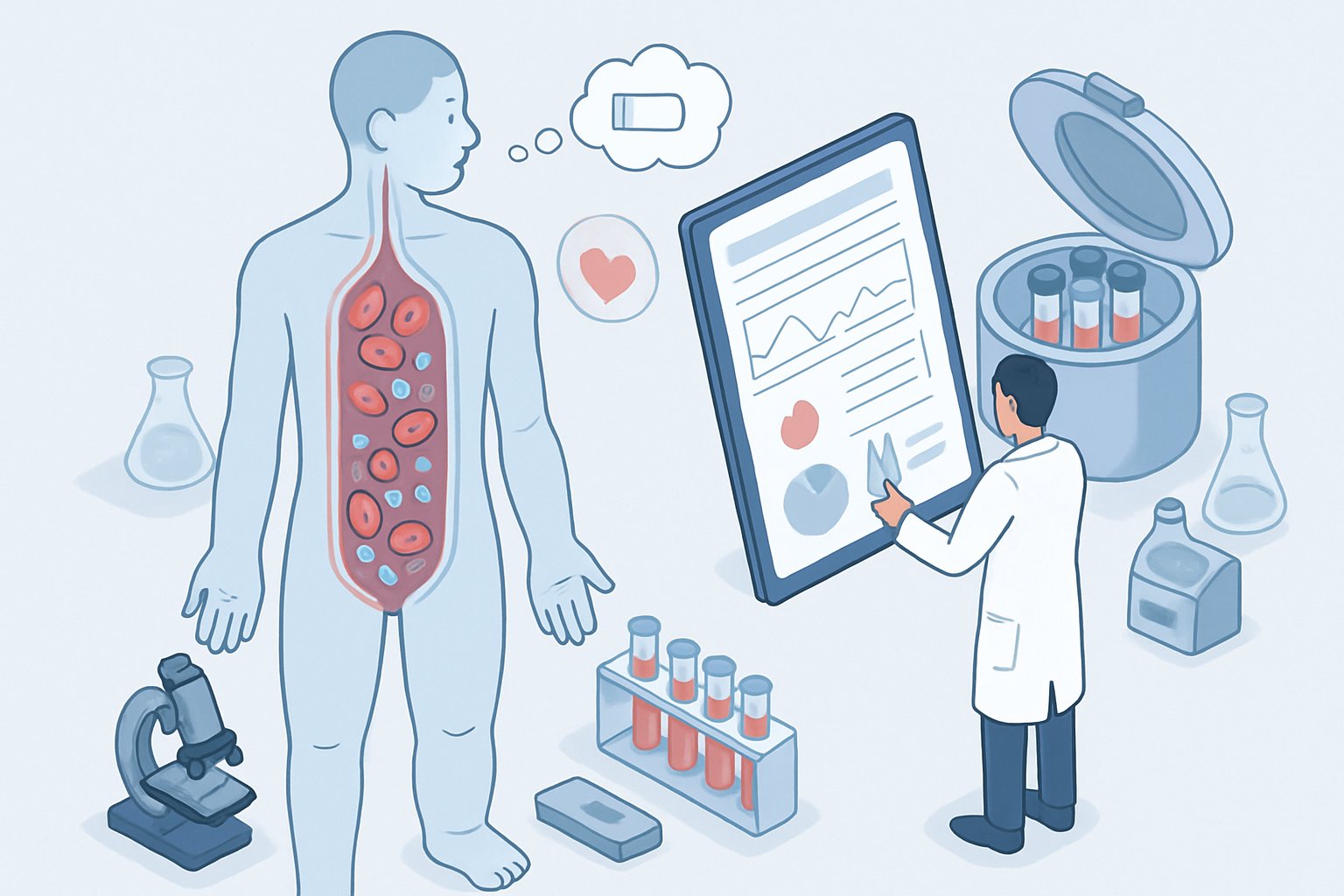
Doctors use blood tests to measure albumin levels and check for values below 3.5 grams per deciliter. They also look at eating habits and run other lab tests to find the cause.
Serum Albumin Blood Test
The serum albumin measurement[1] is the main test doctors use to check albumin levels. A simple blood draw from the arm provides the sample needed.
Normal albumin levels range from 3.5 to 5.0 grams per deciliter. Levels below 3.5 indicate hypoalbuminemia.
The blood test takes just a few minutes. Lab results usually come back within 24 hours.
Doctors often order this test when patients show signs of swelling or fluid buildup. Hospitalized patients[5] get regular albumin checks to track their health status.
The test requires no special preparation. Patients can eat and drink normally before the blood draw.
Nutritional Assessment
Doctors check eating habits and body weight to see if poor nutrition causes low albumin. They ask about recent weight loss and changes in appetite.
Key areas doctors examine include:
- Daily food intake and meal patterns
- Protein consumption from meat, fish, and dairy
- Recent illnesses that affected eating
- Access to healthy foods
Body mass index helps show if someone is underweight. Doctors also check for signs of muscle wasting in the arms and legs.
Blood tests can reveal vitamin deficiencies that go along with poor nutrition. Low protein intake often leads to low serum albumin[6] levels over time.
Related Laboratory Evaluations
Other blood tests help doctors find what causes low albumin levels. These tests check how well the liver and kidneys work.
Common tests include:
| Test Type | What It Checks |
|---|---|
| Liver enzymes | Liver damage or disease |
| Kidney function | Protein loss through urine |
| Complete blood count | Signs of infection or inflammation |
| Protein levels | Total protein in the blood |
Urine tests show if the kidneys are leaking protein. High protein in urine often means kidney disease.
Doctors may order imaging tests like ultrasounds to check organ health. These help rule out serious conditions that affect albumin production.
Treatment and Management Strategies
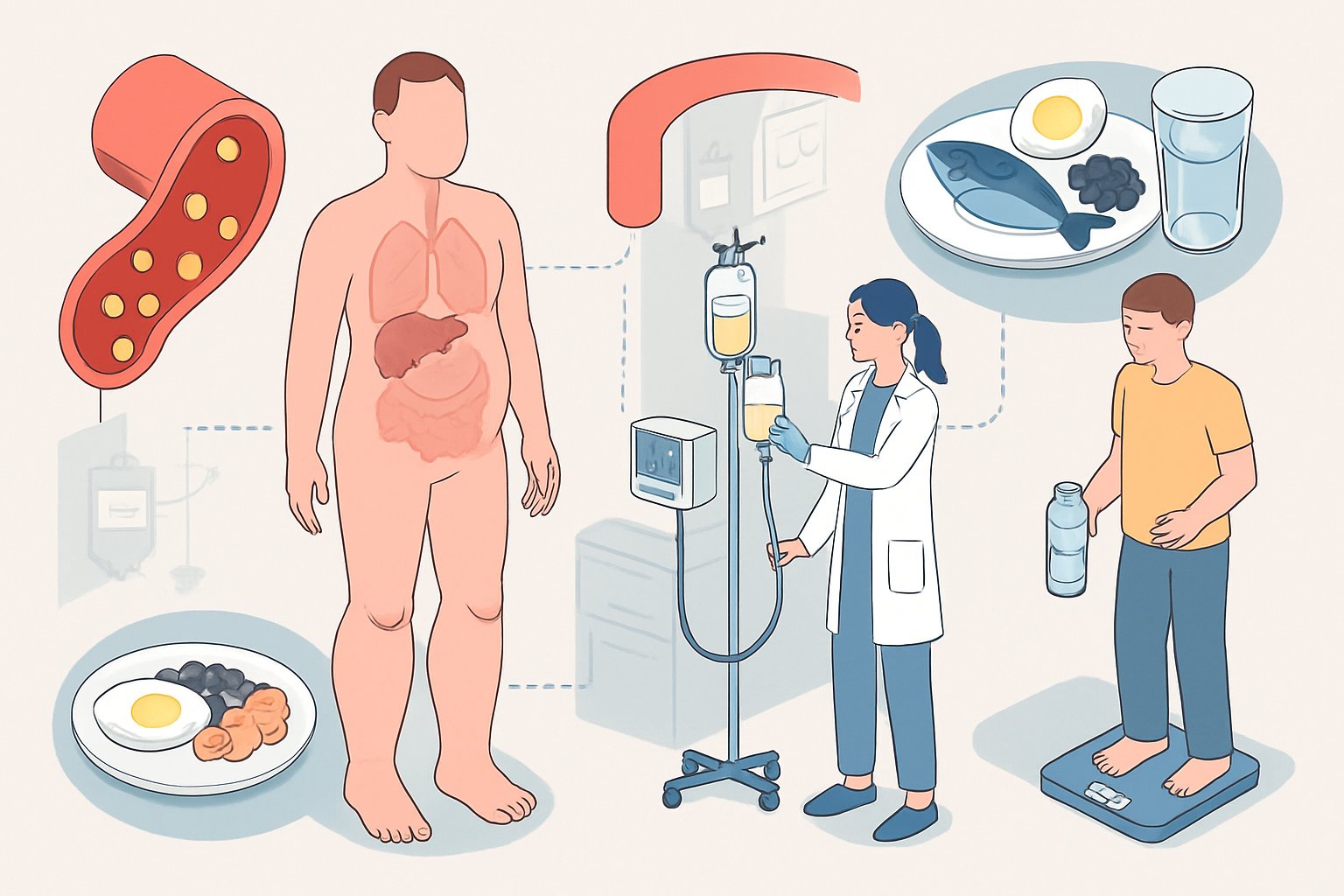
Treatment focuses on fixing the root problem[7] that caused low albumin levels. Doctors may also give albumin through an IV and recommend eating more protein to help the body recover.
Addressing Underlying Causes
The most important step in treating low albumin is finding and fixing the health problem that caused it. Doctors need to treat the main disease first.
If a patient has liver disease, doctors focus on protecting the liver and stopping more damage. People with kidney problems get treatments to help their kidneys work better.
Patients with infections need antibiotics or other medicines to fight the infection. Those with digestive problems may need medicines to help them absorb nutrients better.
Medical treatment plans[1] change based on what caused the low albumin. Some patients need surgery if their condition requires it.
Doctors often work with other specialists like kidney doctors or stomach doctors. This team approach helps treat complex cases better.
Albumin Infusions and Medical Treatments
Doctors sometimes give albumin infusion treatments through an IV when levels are very low. These intravenous albumin treatments help replace the missing protein quickly.
Intravenous albumin infusion works best for certain conditions. Patients with severe liver disease benefit most from albumin infusions[7] because it lowers their risk of kidney problems and death.
People with serious infections in their belly fluid also do better when they get both antibiotics and albumin treatments. The albumin helps clear harmful toxins from their body.
Albumin infusions are not right for everyone. Doctors check each patient carefully before deciding if IV albumin will help them.
The treatments work by putting protein directly into the blood. This helps keep fluid in the right places in the body.
Dietary Recommendations for Recovery
Eating enough high-quality protein helps the body make more albumin naturally. Patients need to focus on getting good protein intake every day.
Lean meats like chicken and turkey provide complete proteins that the body can use easily. Fish like salmon and tuna are also excellent protein sources.
Eggs contain all the building blocks the body needs to make albumin. They are one of the best protein foods for recovery.
Patients should eat protein at every meal. The body cannot store extra protein, so spreading it throughout the day works better.
Some people may need protein supplements if they cannot eat enough food. A dietitian can help create the right eating plan for each person’s needs.
Frequently Asked Questions
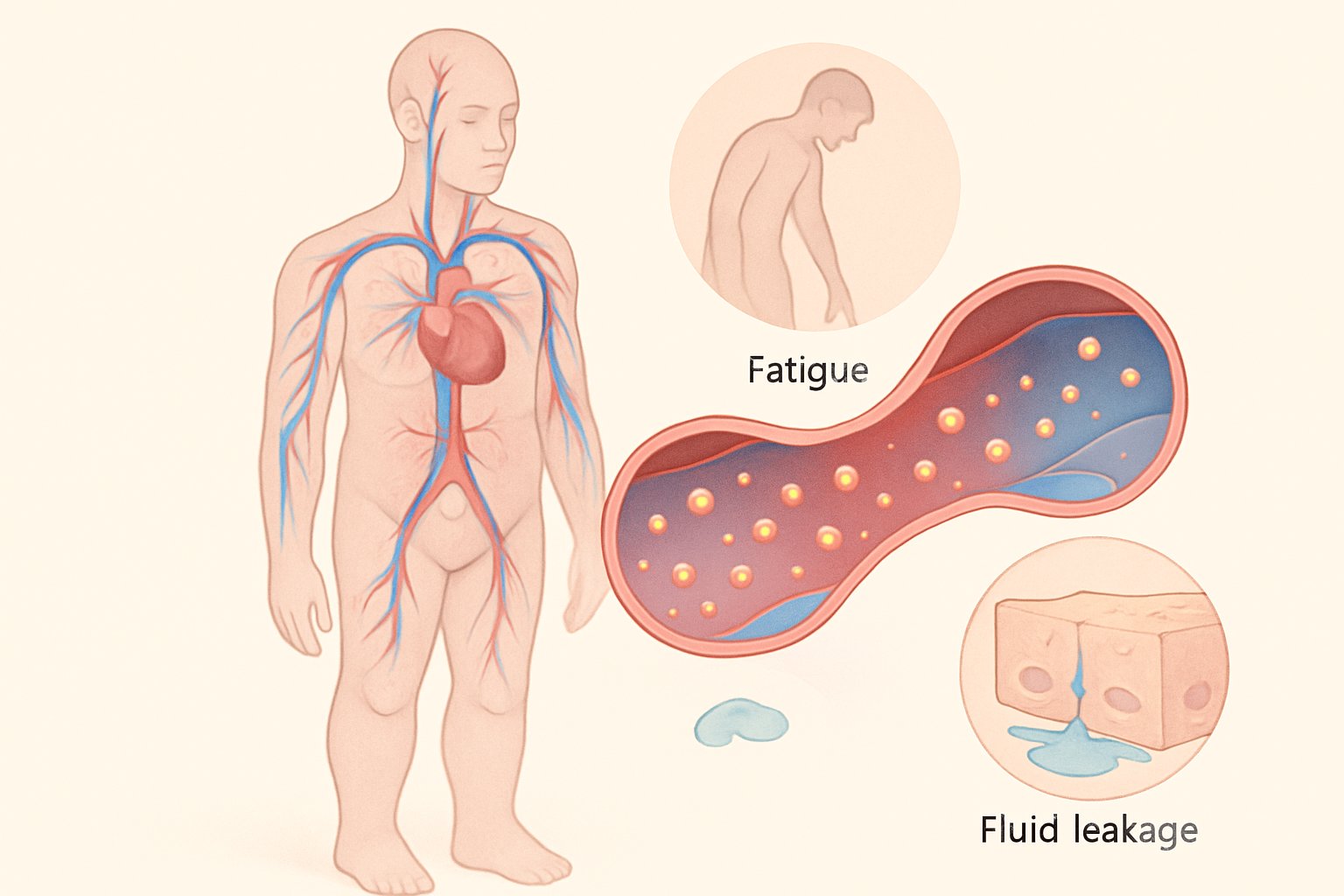
Low albumin levels create specific symptoms and require targeted treatments based on the underlying cause. Medical interventions range from dietary changes to medications depending on what condition triggered the albumin deficiency.
What are the common symptoms associated with low albumin levels?
People with low albumin often develop swelling in their legs, ankles, and feet. This happens because albumin normally keeps fluid inside blood vessels.
When albumin drops, fluid leaks into surrounding tissues. The swelling usually starts in the lower body and can move upward.
Other symptoms include fatigue and weakness. Some people notice their belly becomes swollen with fluid.
Can a deficiency in albumin lead to fatal health conditions?
Severe albumin deficiency can become life-threatening if left untreated. The condition affects how well the heart and kidneys work.
Very low albumin levels can cause dangerous fluid buildup in the lungs. This makes breathing difficult and requires immediate medical care.
The underlying diseases that cause low albumin are often more dangerous than the low albumin itself. Liver failure and kidney disease can both be fatal without proper treatment.
What is the expected prognosis for individuals with chronic low albumin?
The outlook depends on what caused the albumin to drop. People with liver disease may have a more serious prognosis than those with malnutrition.
Early treatment usually leads to better outcomes. Albumin levels can return to normal when doctors treat the root cause successfully.
Chronic cases require ongoing medical care and monitoring. Regular blood tests help doctors track progress and adjust treatments.
What dietary or medical interventions can help to increase albumin levels?
Eating protein-rich foods[1] like lean meats, fish, eggs, and dairy products helps boost albumin production. Nuts such as almonds, cashews, and walnuts also provide needed protein.
Whole-grain foods like bread and rice support overall nutrition. Taking vitamin D supplements may help if someone has a deficiency.
Doctors may recommend avoiding alcohol since it can make symptoms worse. A balanced diet addresses malnutrition that often contributes to low albumin.
What are the standard treatments for low albumin in the body?
Treatment varies based on the underlying condition[1] that caused low albumin levels. Doctors focus on fixing the root problem rather than just the albumin number.
Blood pressure medications help when kidney disease or heart failure caused the problem. Antibiotics treat severe burns that may lower albumin.
Anti-inflammatory medicines can reduce inflammation that affects albumin production. People with kidney failure may need dialysis treatments.
What underlying conditions might cause a decrease in albumin?
Liver disease is a common cause since the liver produces albumin protein[6]. When the liver is damaged, it cannot make enough albumin.
Kidney disease allows albumin to leak out through urine. Heart failure and severe burns also lower albumin levels.
Malnutrition and poor diet prevent the body from getting enough protein to make albumin. Some cancers and infections can also cause albumin to drop.
References
- Hypoalbuminemia: Causes, Symptoms, Treatment & Outlook. https://my.clevelandclinic.org/health/diseases/22529-hypoalbuminemia Accessed October 27, 2025
- Complications of Hypoalbuminemia: Risks & Impact. https://www.acibademhealthpoint.com/complications-of-hypoalbuminemia-risks-impact/ Accessed October 27, 2025
- Just a moment.... https://www.osmosis.org/answers/serum-albumin Accessed October 27, 2025
- Normal albumin levels range from 3.4 to 5.4 grams per deciliter. https://www.verywellhealth.com/albumin-5076351 Accessed October 27, 2025
- Low albumin levels are associated with generalized weakness, low muscle mass, and increased inflammation. https://www.verywellhealth.com/hypoalbuminemia-8594577 Accessed October 27, 2025
- 403 Forbidden. https://www.apollohospitals.com/diseases-and-conditions/hypoalbuminemia Accessed October 27, 2025
- Hypoalbuminemia Treatment & Management: Medical Care, Surgical Care, Consultations. https://emedicine.medscape.com/article/166724-treatment Accessed October 27, 2025
